News & Events
Student Awards
Congratulations to our students for all of their hard work!
Phi Kappa Phi Conference
Sneha Cauhan received "Best Presentation Oral Award" in the Arsenal A Oral Symposium session.
Graduate Research Day 2021
- Rebekah Robinson received the ThermoFisher/Phi Kappa Phi Excellence in Research Award.
- Marissa Seamon received the Graduate School Award for Excellence in Research.
- Yanyan Xu received the Award for Excellence in Research – Genomic Medicine.
Added April 2021
New approach emerges to better classify, treat brain tumors

A look at RNA tells us what our genes are telling our cells to do, and scientists say looking directly at the RNA of brain tumor cells appears to provide objective, efficient evidence to better classify a tumor and the most effective treatments.
Read more at JagWire
Watch more at Fox 54
Added 1/21/2021
2020
Proteins could be source for new blood test for cervical cancer, better therapies

For cervical cancer patients, for instance, the therapy could include quercetin, a
plant-derived flavonol, and vitamin C.
Read more at Augusta Chronicle
Added 12/4/2020
Gene signature found for poor response to standard chemotherapy in rare uterine cancer

Women who don’t survive a rare and aggressive uterine cancer called uterine serous carcinoma, have high expression of a group of 73 genes, a score scientists say can help identify these women and improve their outcome.
Read more at JagWire
Added 4/28/2020
Augusta University cancer therapy research turning to COVID-19

After working to try and create therapies that specifically target cancer cells, Dr. Jin-Xiong She is hoping to use that same approach to create a new therapy for COVID-19.
Read more at The Augusta Chronicle
Added 4/10/2020
Tran receives scholarship honoring women in higher education

CONGRATULATIONS TO LYNN TRAN
Great News! Lynn Tran, MD/PhD student of CBGM, has received the 2020 Louise McBee Scholarship sponsored by the Georgia Association for Women in Higher Education (GAWHE).
Congratulations Lynn!
Read more at EurekAlert!
Added 2/12/2020

CONGRATULATIONS TO DR. SHRUTI SHARMA
Great News! Dr. Shruti Sharma, Assistant Professor at CBGM, has been awarded the 2020 Provost's Award by the Graduate School at Augusta University.
Heartiest Congratulations Dr. Sharma!
Added 1/7/2020
2019

CONGRATULATIONS TO DR. RICHARD MCINDOE
Great News! Dr. Richard McIndoe, Professor & Associate Director of CBGM, has been awarded a 1 year sub-contract from UC San Diego entitled: Coordinating and Bioinformatics Unit for the MMPC/DiaComp.
Congratulations Dr. McIndoe!
Added 8/1/2019

CONGRATULATIONS TO PAUL TRAN
Great News! Paul Tran, MD/PhD student of CBGM, has been awarded a NIH 3 year F30 award entitled: Deep Learning based Genetic Risk Prediction for Type 1 Diabetes.
Congratulations to Paul!
Added 7/1/2019

CONGRATULATIONS TO DR. ASHOK SHARMA
Congratulations to Dr. Ashok Sharma on receiving the 2019 Outstanding Young Basic Science Faculty Award, Medical College of Georgia presented at the MCG Faculty Awards Ceremony on April 25, 2019.
Congratulations on this well deserved honor!
Added 4/25/2019

CONGRATULATIONS TO LYNN TRAN!
Congratulations to Lynn Trann (laboratory of Dr. Jin-Xiong She) who won the silver medal in the Three Minute Thesis Competition with her speech on Personalizing uterine cancer treatment.
Congratulations Lynn!
Added 4/25/2019
2018
Guest Speaker: Minglu Gao, B.E.
Friday, May 25th, 2018
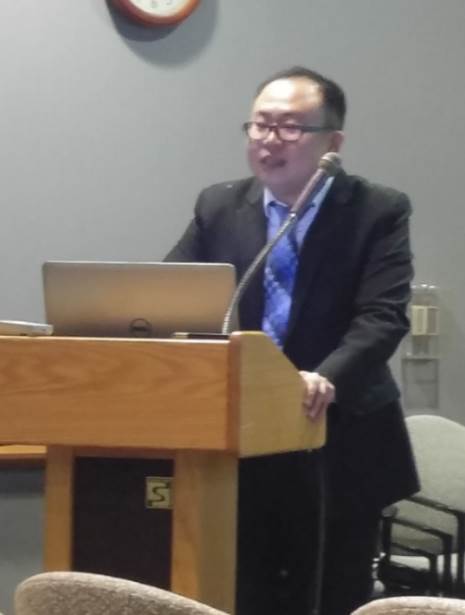
Seminar Title:
Molecular exploration of fungal beta-lactamases and antagonisms between two maize
endophytes, Fusarium verticillioides and Sarocladium zeae
Fusarium verticillioides (Fv) is a prevalent seed-borne maize endophyte capable of causing severe kernel rot and fumonisin mycotoxin contamination. Within maize kernels, Fv is primarily confined to the pedicel, while another co-occurring seed-borne fungal endophyte, Sarocladium zeae (Sz), is generally isolated in the endosperm and embryo. In vitro competition assays have indicated Sz can inhibit the growth of Fv. The two lactam-containing antibiotics produced by Sz, named pyrrocidine A and B, are associated with this inhibition of Fv. To explore the mechanism of antagonism, RNA-seq experiments were conducted by challenging the Fv with pyrrocidine B at subinhibitory concentrations. Among the most differentially expressed genes was FVEG_11089 (up-regulated 470-fold) that codes for an ABC transporter. Deletion of FVEG_11089 caused increased sensitivity of Fv to pyrrocidine B. The expression of FVEG_11089 is independent of its adjacent and similarly-induced transcription factor. Additionally, deletion of a PB-induced zinc-binding dehydrogenase gene in Fv led to >10-fold increase in fumonisin production compared to wild type. Hence, we theorize that FVEG_11089 functions in pyrrocidine B resistance by transporting the antibiotic out of the Fv cells. Exposure to pyrrocidine B may suppress fumonisin production and affect the pathogenicity of Fv. Further exploration of the antifungal resistance mechanisms addresses the overall competitive relationships of the two maize seed endophytes colonizing the same ecological niche and how they cope with xenobiotic challenges.
Graduate Research Day Awards
Friday, March 23th, 2018
Augusta University
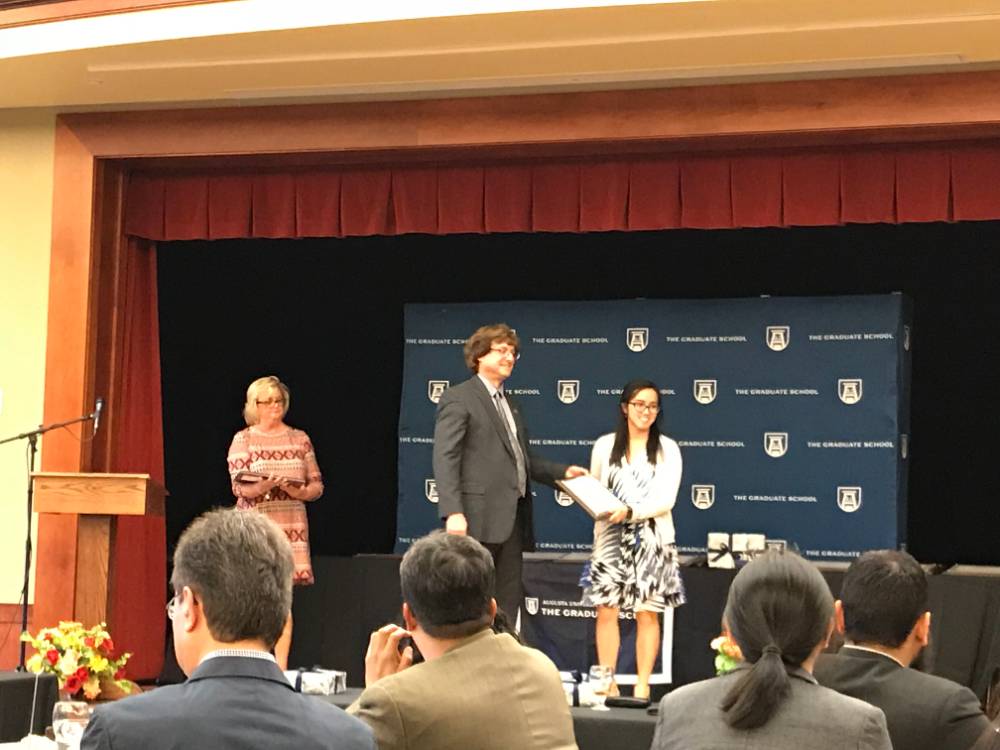
Lynn KH Tran, recipient of the 2018 Graduate Day Research Award in Genomic Medicine.
McIndoe honored with Georgia Bio Award
February 14, 2018

Dr. Richard McIndoe is one of the recipients of the 2018 Life Sciences Health Impact Awards from Georgia Bio. McIndoe and the MCG Center for Biotechnology and Genomic Medicine will receive the group's Deal of the Year Award.
Read more at Jagwire News
New technology enables identification of biomarkers for a wide range of diseases
February 12, 2018
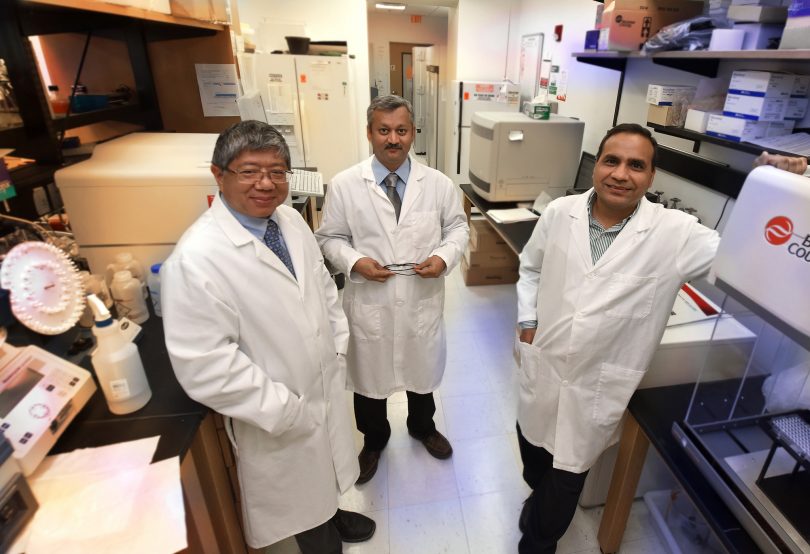
'Scientists have developed a way to identify biomarkers for a wide range of diseases by assessing the antibodies we are making to the complex sugars coating our cells.'
Read more at Jagwire News
2017
Graduate Research Day Awards Banquet
Tuesday, March 28th, 2017
At the Kroc Center, Augusta University
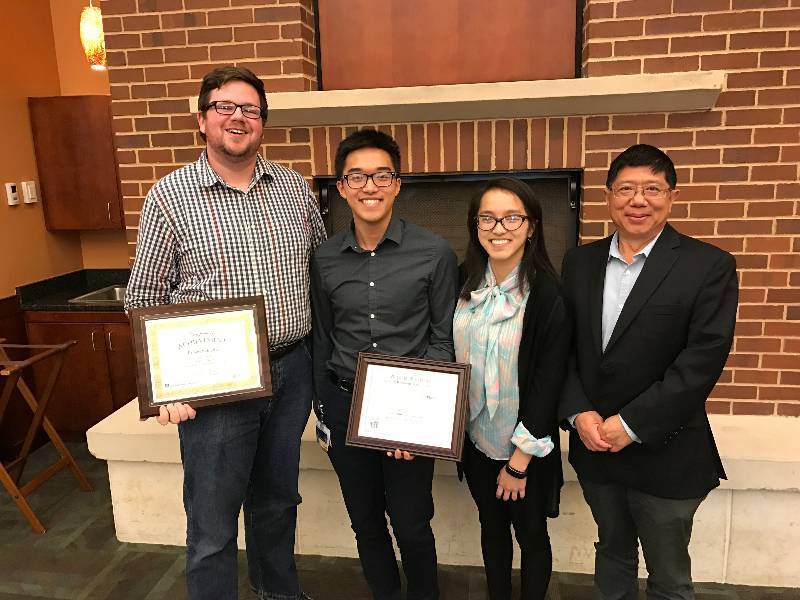
At the Graduate Research Day awards banquet, CBGM graduate students were honored for their recent successes. Robert Schleifer (left), a 5th year PhD student in the laboratory of Dr. Jin-Xiong She, was recognized for being a semi-finalist in Augusta University's inaugural 3MT competition. Paul Tran (middle left), a Graduate Year 1 M.D./Ph.D. student in Dr. She's lab, received an award for his Graduate Research Day poster as the recipient of the Award for Excellence in Research in Genomic Medicine. Also pictured are fellow graduate student Lynn Tran (middle right) and their mentor, Dr. She (right).
2016
Augusta University is researching a new drug that might help with diabetes-related blindness
Tuesday, December 27, 2016
'Dr. Shruti Sharma of the Center for Biotechnology and Genomic Medicine has a $1.5 million grant from the National Eye Institute to look at basic research into blocking inflammation among epithelial cells in light-sensing retina in the eye, Sharma is looking at a well-known agent in inflammation called interleukin-6 that can affect those cells even though they lack the receptor normally needed for such interaction, an effect called trans-signaling.'
Read more at The Augusta Chronicle.
Therapy could be guided 'missile' against cancer
Monday, August 1, 2016
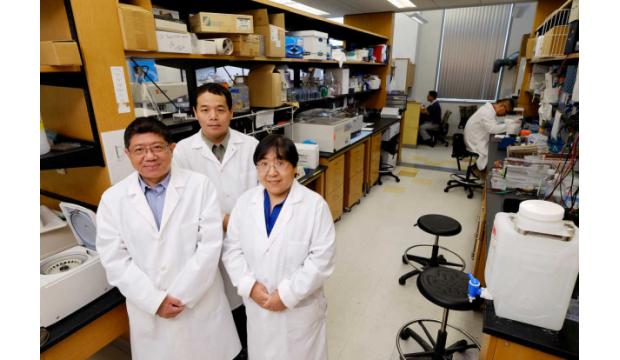
'Using a double-targeted vehicle to home in on prostate cancer cells provides a highly targeted attack against interlocking mechanisms of survival to induce cell death and shrink tumors,'
Read more at The Augusta Chronicle.